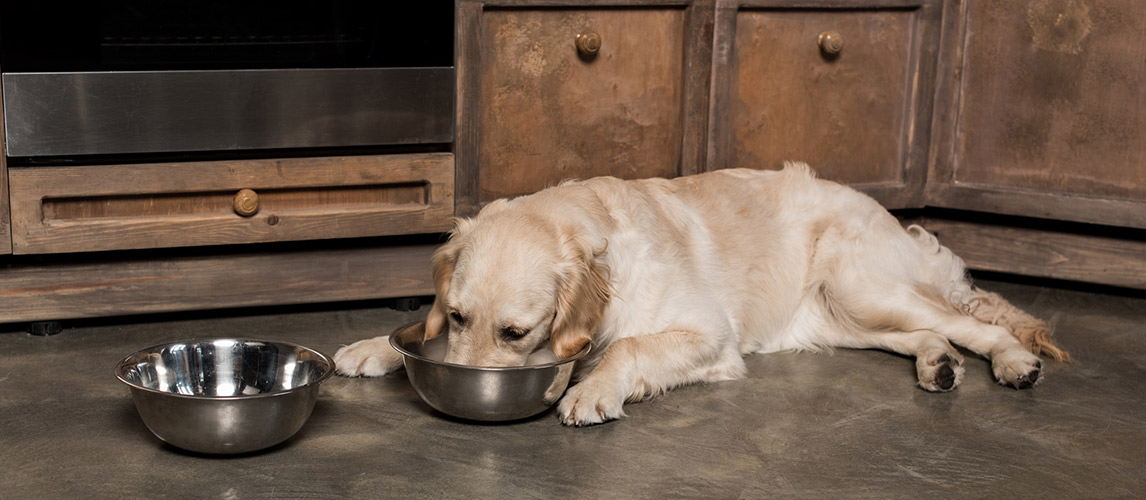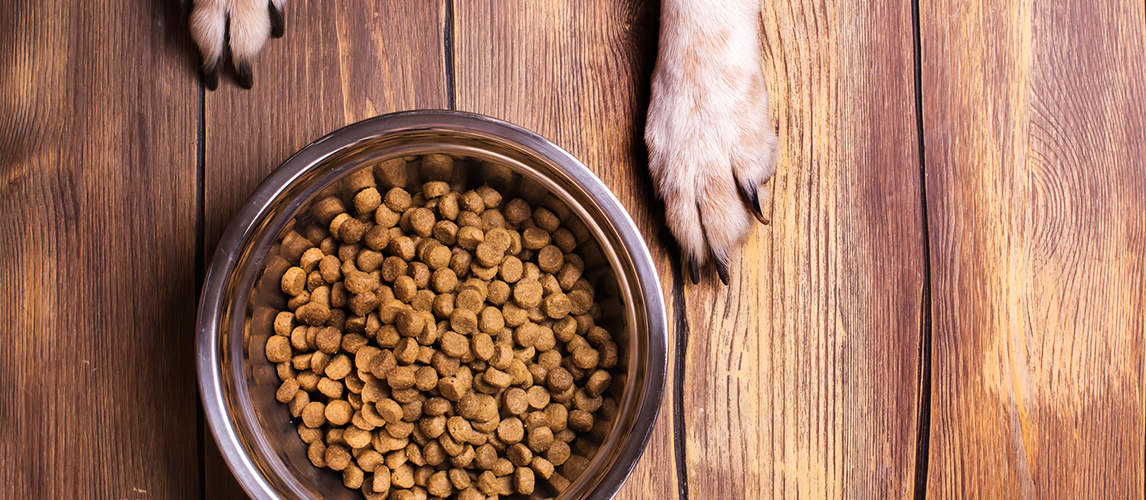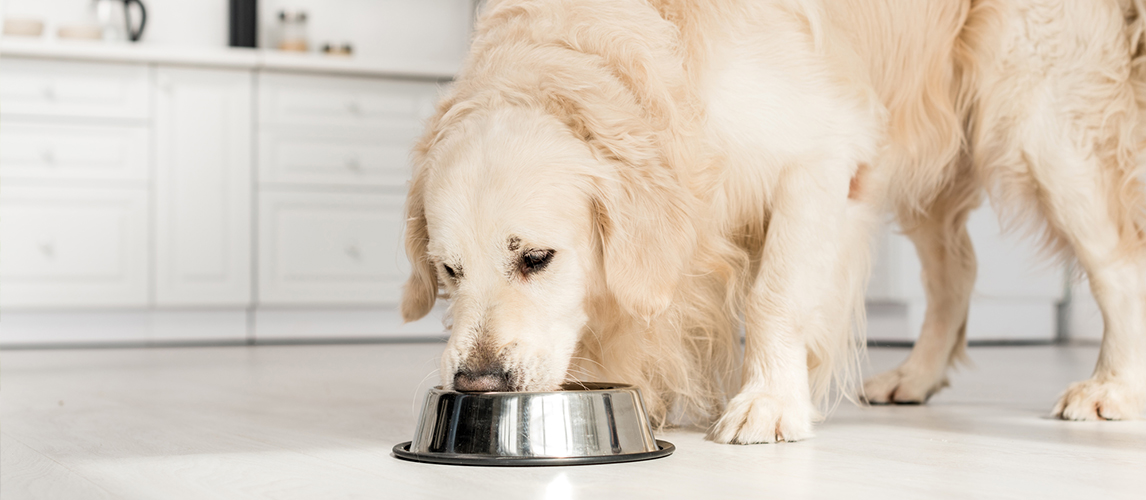Dogs with sensitive stomachs tend to have a hard time finding food that won't trigger them. Seeing as most dog foods tend to contain allergens of some kind, as an owner it can feel a bit overwhelming trying to find the perfect fit for your pup. First, it is important to understand that food for sensitive stomachs is not necessarily completely free of allergens as you will see in our list below. However, they are focused on making food easily digestible in order to help your pup digest it as quickly and easily as possible. And we've even picked out a couple of limited ingredient recipes to really narrow it down for you.
10 Top-Rated Dog Foods for Sensitive Stomachs
1 Wellness Simple Natural Limited Ingredient Dry Dog Food

- First 5 Ingredients: Salmon, Salmon Meal, Potatoes, Peas, Dried Ground Potatoes
- Primary Proteins: Salmon
- Calories: 446 kcal/cup
- Allergens: Flaxseed
- Flavor: Salmon & Potato
- Type: Dry Dog Food
- Life Stage: Adult
Containing fewer ingredients that could cause an allergic reaction (with just one low-risk possible allergen in the entire recipe), this limited ingredient formula does exactly what it says on the bag. When looking to change your dog’s food to a limited ingredient diet, you should always check first with your veterinarian to see if this is the best move forward. In some cases of dogs with sensitive stomachs, they may only require additional fiber to help them cope, as opposed to a full diet change.
Wellness has been careful to avoid meat by-products, corn, gluten, soy, wheat, eggs, dairy, and artificial flavors or preservatives. All ingredients that have been known at one time or another to have caused negative reactions. This is the ideal food if you are wanting to cut all the way back to basics and slowly re-introduce troublesome ingredients one at a time. Head over to our review of Wellness Core dog food for more options.
Salmon, Salmon Meal, Potatoes, Peas, Dried Ground Potatoes, Tomato Pomace, Ground Flaxseed, Canola Oil (preserved with Mixed Tocopherols), Dicalcium Phosphate, Natural Fish Flavor, Chicory Root Extract, Vitamin E Supplement, Choline Chloride, Taurine, Mixed Tocopherols added to preserve freshness, Zinc Proteinate, Zinc Sulfate, Calcium Carbonate, Niacin, Ferrous Sulfate, Iron Proteinate, Beta-Carotene, Vitamin A Supplement, Copper Sulfate, Thiamine Mononitrate, Copper Proteinate, Manganese Proteinate, Manganese Sulfate, d-Calcium Pantothenate, Sodium Selenite, Pyridoxine Hydrochloride, Riboflavin, Vitamin D3 Supplement, Biotin, Calcium Iodate, Vitamin B12 Supplement, Folic Acid, Ascorbic Acid (Vitamin C), Dried Lactobacillus plantarum Fermentation Product, Dried Enterococcus faecium Fermentation Product, Dried Lactobacillus casei Fermentation Product, Dried Lactobacillus acidophilus Fermentation Product, Rosemary Extract, Green Tea Extract, Spearmint Extract.

2 Purina Pro Plan Sensitive Skin & Stomach

- First 5 Ingredients: Salmon, Barley, Rice, Oat Meal, Canola Meal
- Primary Proteins: Salmon, Fish, Beef
- Calories: 467 kcal/cup
- Allergens: Oat Meal, Fish Meal, Beef Fat, Dried Yeast, Fish Oil, Salt (irritant)
- Flavor: Salmon & Rice Formula
- Type: Dry Dog Food
- Life Stage: Adult
Purina’s Pro Plan recipe has been developed not only to meet the dietary needs of your dog in terms of digestibility but also to help maintain healthy skin and coat – the areas most commonly affected by allergic reactions. By introducing a healthy dose of omega fatty acids in your dog’s diet, you can ensure their coat stays shiny and their skin hydrated, reducing the chance of it becoming irritated and itchy.
This food does contain some of the less-common allergens. However, this particular formula is not designed to avoid all allergens, so much as help dogs to process their food more easily and be able to bypass troublesome digestive issues. Furthermore, the high caloric content means you won’t feed to feed your dog as much to ensure they’re getting a full meal. For more options, check out our detailed review of Purina Pro Plan Dog Food.
Salmon (Source of Glucosamine), Rice Flour, Pearled Barley, Oat Meal, Corn Gluten Meal, Chicken By-Product Meal (Source of Glucosamine), Beef Fat Naturally Preserved with Mixed-Tocopherols, Liver Flavor, Mono and Dicalcium Phosphate, Fish Oil, Salt, Calcium Carbonate, Potassium Chloride, Dried Carrots, Dried Peas, Vitamins [Vitamin E Supplement, Niacin (Vitamin B-3), Vitamin A Supplement, Calcium Pantothenate (Vitamin B-5), Thiamine Mononitrate (Vitamin B-1), Vitamin B-12 Supplement, Riboflavin Supplement (Vitamin B-2), Pyridoxine Hydrochloride (Vitamin B-6), Folic Acid (Vitamin B-9), Menadione Sodium Bisulfite Complex (Vitamin K), Vitamin D-3 Supplement, Biotin (Vitamin B-7)], Minerals [Zinc Sulfate, Ferrous Sulfate, Manganese Sulfate, Copper Sulfate, Calcium Iodate, Sodium Selenite], Choline Chloride, L-Lysine Monohydrochloride. I-4187.

3 Hill’s Science Diet Adult Sensitive Stomach & Skin

- Brand: Hill’s Science Diet
- First 5 Ingredients: Chicken, Brewers Rice, Chicken Meal, Yellow Peas, Cracked Pearled Barley
- Primary Protein Source: Chicken
- Calories: 382 kcal/cup
- Flavor: Chicken Meal & Barley
- Life Stage: Adult
Hill’s Science Diet is a tried and tested diet for dogs known to struggle with a sensitive stomach. Whilst chicken can an allergen for dogs that have developed an allergy to it over time, it is actually not a bad ingredient to have. In fact, chicken is high in protein and often recommended by vets boiled and served with rice as a way to help settle an upset stomach.
Chicken by-product meal is perfect for boosting the protein content, whilst the yellow peas, barley, brown rice, and fresh chicken ingredients help to maintain digestibility. Not only can proper digestibility help your dog to be more comfortable in day-to-day life, but it can also help to strengthen your dog’s immune system. This is because it is freed up to focus on their overall health without the bother of digestive complications. You may also like our Hill’s Science Diet Dog Food Review.
Chicken, Brewers Rice, Chicken Meal, Yellow Peas, Cracked Pearled Barley, Whole Grain Sorghum, Egg Product, Chicken Fat, Soybean Oil, Brown Rice, Dried Beet Pulp, Chicken Liver Flavor, Lactic Acid, Pork Liver Flavor, Potassium Chloride, Flaxseed, Iodized Salt, vitamins (Vitamin E Supplement, L-Ascorbyl-2-Polyphosphate (source of Vitamin C), Niacin Supplement, Thiamine Mononitrate, Vitamin A Supplement, Calcium Pantothenate, Riboflavin Supplement, Biotin, Vitamin B12 Supplement, Pyridoxine Hydrochloride, Folic Acid, Vitamin D3 Supplement), Choline Chloride, Taurine, minerals (Ferrous Sulfate, Zinc Oxide, Copper Sulfate, Manganous Oxide, Calcium Iodate, Sodium Selenite), Mixed Tocopherols for freshness, Oat Fiber, Natural Flavors, Beta-Carotene, Apples, Broccoli, Carrots, Cranberries, Green Peas.

4 Purina ONE SmartBlend Natural Sensitive Systems Dry Food

- First 5 Ingredients: Salmon (Source of Glucosamine), Rice Flour, Pearled Barley, Oat Meal, Corn Gluten Meal
- Primary Proteins: Salmon, Beef, Chicken
- Calories: 438 kcal/cup
- Allergens: Barley, Corn Gluten Meal, Chicken, Beef, Fish Oil, Salt (irritant),
- Flavor: Salmon
- Type: Dry Dog Food
- Life Stage: Adult
Here we have the smart blend formula of Purina Once’s sensitive range. Not only does this food focus on maintaining healthy digestion by avoiding the vast majority of well-known allergens (making it one of the top dog foods for sensitive stomachs on our list), but it also focuses on coat health for dogs that may experience skin issues as a result of their sensitivities.
Furthermore, this food contains an abundance of essential nutrients, vitamins, and minerals that are specifically chosen to help your dog to maintain a healthy immune system, keeping them stronger for longer. They have made a conscious decision to avoid any fillers, meaning all your getting are the best ingredients possible for your pup focussing entirely on nutrition and getting the job done properly.
Salmon (Source of Glucosamine), Rice Flour, Pearled Barley, Oat Meal, Corn Gluten Meal, Chicken By-Product Meal (Source of Glucosamine), Beef Fat Naturally Preserved with Mixed-Tocopherols, Liver Flavor, Mono and Dicalcium Phosphate, Fish Oil, Salt, Calcium Carbonate, Potassium Chloride, Dried Carrots, Dried Peas, Vitamins [Vitamin E Supplement, Niacin (Vitamin B-3), Vitamin A Supplement, Calcium Pantothenate (Vitamin B-5), Thiamine Mononitrate (Vitamin B-1), Vitamin B-12 Supplement, Riboflavin Supplement (Vitamin B-2), Pyridoxine Hydrochloride (Vitamin B-6), Folic Acid (Vitamin B-9), Menadione Sodium Bisulfite Complex (Vitamin K), Vitamin D-3 Supplement, Biotin (Vitamin B-7)], Minerals [Zinc Sulfate, Ferrous Sulfate, Manganese Sulfate, Copper Sulfate, Calcium Iodate, Sodium Selenite], Choline Chloride, L-Lysine Monohydrochloride. I-4187.

5 Blue Buffalo True Solutions Blissful Belly Recipe Dry Dog Food

- First 5 Ingredients: Deboned Chicken, Chicken Meal, Brown Rice, Oatmeal, Barley
- Primary Proteins: Chicken
- Calories: 394 Kcals/cup
- Allergens: Chicken, Oatmeal, Barley, Potatoes, Egg, Flaxseed, Salt (irritant), Yeast,
- Flavor: Chicken
- Type: Dry Dog Food
- Life Stage: Adult
The Blue Buffalo True Solutions range is filled with food specifically designed for various areas of care. The Blissful Belly dry food is centered around digestion as opposed to avoiding ingredients. The right dog food doesn’t necessarily require the removal of ingredients, but rather the addition and re-arranging of ingredients to produce the ideal formula.
Using prebiotic fiber and a balanced mix of vitamins, minerals, and antioxidants for additional protection, this food is ideal for helping to settle a dog’s sensitive stomach after a difficult spell of digestive distress. Prebiotic fiber actively works to improve gut health and encourage healthy digestion by helping to restore good gut flora and ease the entire process. You can also read our in-depth Blue Buffalo dog food review here.
Deboned Chicken, Chicken Meal, Brown Rice, Oatmeal, Barley, Potatoes, Dried Egg Product, Natural Flavor, Flaxseed (source of Omega 3 Fatty Acids), Dried Tomato Pomace, Dried Plain Beet Pulp, Canola Oil (source of Omega 6 Fatty Acids), Peas, Pea Protein, Salt, Calcium Carbonate, Hydrolyzed Yeast, Fructooligosaccharides, Pea Fiber, Alfalfa Nutrient Concentrate, Dehydrated Alfalfa Meal, Potassium Chloride, Choline Chloride, Taurine, L-Threonine, Vitamin E Supplement, preserved with Mixed Tocopherols, L-Ascorbyl-2-Polyphosphate (source of Vitamin C), L-Tryptophan, DL-Methionine, Zinc Amino Acid Chelate, Zinc Sulfate, Vegetable Juice for color, Ferrous Sulfate, Iron Amino Acid Chelate, Blueberries, Cranberries, Barley Grass, Parsley, Turmeric, Dried Kelp, Yucca Schidigera Extract, Niacin (Vitamin B3), Calcium Pantothenate (Vitamin B5), Copper Sulfate, Biotin (Vitamin B7), L-Lysine, Vitamin A Supplement, Copper Amino Acid Chelate, Manganese Sulfate, Manganese Amino Acid Chelate, Dried Yeast, Dried Enterococcus faecium fermentation product, Dried Lactobacillus acidophilus fermentation product, Dried Aspergillus niger fermentation extract, Dried Trichoderma longibrachiatum fermentation extract, Dried Bacillus subtilis fermentation extract, Thiamine Mononitrate (Vitamin B1), Riboflavin (Vitamin B2), Vitamin D3 Supplement, Vitamin B12 Supplement, Pyridoxine Hydrochloride (Vitamin B6), Calcium Iodate, Folic Acid (Vitamin B9), Sodium Selenite, Oil of Rosemary.

6 Solid Gold Grain Free & Gluten Free Holistic Adult Dry Dog Food

- First 5 Ingredients: Salmon, Ocean Fish Meal, Chickpeas, Lentils, Peas
- Primary Proteins: Salmon, Ocean Fish, Chicken
- Calories: 388 kcal/cup
- Allergens: Chicken, Egg, Salt (irritant)
- Flavor: Cold water Salmon & Vegetables
- Type: Dry Dog Food
- Life Stage: Adult
Solid Gold’s sensitive stomach recipe utilizes a similar approach to limited ingredient dog foods in that they have avoided the use of grains and gluten – both known allergens and potentially troublesome ingredients. They have been careful to avoid the use of artificial flavors and simply rely on the taste of the fresh ingredients used.
Not only does this food help to maintain gut health, but it also strengthens your dog’s immune system with the use of superfoods, vitamins, and minerals to support all areas of development and day-to-day function. It also has a healthy helping of protein and a good caloric density, meaning you’re not having to overload your dog with food in order to ensure they have eaten enough. The only downside to this food is the use of salt (though minimal), which can be a mild irritant for some dogs.
Salmon, Ocean Fish Meal, Chickpeas, Lentils, Peas, Chicken Fat (Preserved with Mixed Tocopherols), Tapioca, Pea Fiber, Salmon Meal, Dried Eggs, Natural Flavor, Dicalcium Phosphate, Carrots, Potassium Chloride, Salt, Pumpkin, Blueberries, Cranberries, Choline Chloride, Vitamins (Vitamin E Supplement, L-Ascorbyl-2-Polyphosphate (Source of Vitamin C), Niacin, Calcium Pantothenate, Riboflavin, Pyridoxine Hydrochloride, Thiamine Mononitrate, Vitamin A Supplement, Vitamin B12 Supplement, Vitamin D3 Supplement, Biotin, Folic Acid), Minerals (Zinc Sulfate, Ferrous Sulfate, Copper Sulfate, Manganese Sulfate, Zinc Proteinate, Manganese Proteinate, Copper Proteinate, Sodium Selenite, Calcium Iodate), Salmon Oil (Preserved with Mixed Tocopherols), DL-Methionine, Dried Chicory Root, Rosemary Extract, Dried Lactobacillus Acidophilus Fermentation Product, Dried Enterococcus Faecium Fermentation Product, Dried Lactobacillus Casei Fermentation Product.

7 Purina Pro Plan Sensitive Stomach Wet Dog Food
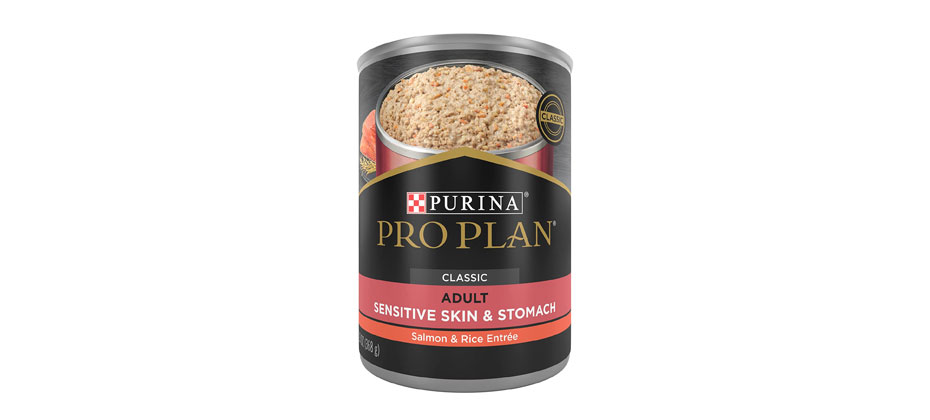
- First 5 Ingredients: Water Sufficient For Processing, Salmon, Rice, Fish, Potato Protein
- Primary Proteins: Salmon
- Calories: 467 kcal/can
- Allergens: Fish, Corn Oil
- Flavor: Salmon & Rice
- Type: Wet Dog Food
- Life Stage: Adult
The ideal wet dog food for dogs that are unable to be fed dry kibble – be it due to food intolerance, dental health problems, or general health issues. The Pro Plan Focus range encourages better hydration, easy eating, and promises a delicate recipe ideally suited to your dog’s sensitive stomach issues.
Most dog owners that select the Focus canned food for their pets are often drawn in by the high water content, deliciously rich flavor, and careful use of prebiotic fiber to aid digestion. This is also great food for a fussy eater, not just a sensitive stomach. Salmon is a much-loved ingredient that provides a different, and refreshing flavor for dogs that have become picky when it comes to chicken, beef, and pork recipes.
Water Sufficient For Processing, Salmon, Rice, Fish, Potato Protein, Corn Oil, Carrots, Inulin, Potassium Chloride, Carrageenan, Locust Bean Gum, Xanthan Gum, Guar Gum, Tricalcium Phosphate, Choline Chloride, Vitamin E Supplement, Zinc Sulfate, Ferrous Sulfate, Thiamine Mononitrate, Niacin, Copper Sulfate, Manganese Sulfate, Calcium Pantothenate, Pyridoxine Hydrochloride, Vitamin B-12 Supplement, Riboflavin Supplement, Vitamin A Supplement, Potassium Iodide, Folic Acid, Vitamin D-3 Supplement, Biotin, And Sodium Selenite.

8 Diamond CARE Adult Dry Dog Food

- First 5 Ingredients: Potatoes, Egg Product, Potato Protein, Tomato Pomace, Chicken Fat
- Primary Proteins: Egg, Potato
- Calories: 410 kcal/cup
- Allergens: Egg, Chicken, Fish Oil, Flaxseed
- Flavor: Unknown
- Type: Dry Dog Food
- Life Stage: Adult
Diamond Care’s sensitive stomach formula is quite unique when compared to other brands. This is because Diamond Care has chosen to focus on the copious amounts of fiber produced by vegetables as opposed to protein sources. Though this may seem like an unusual choice for dog food, the protein levels have not been affected.
Diamond Care’s sensitive stomach formula takes the 25% of protein predominantly from plant-based sources such as potato protein, and flaxseed, whilst retrieving the animal-based protein from the egg product and chicken fat. Believe it or not, a lot of animal protein can be the cause of constipation in pups if they are not very good at staying hydrated. This food removes a lot of that risk and focuses on using plenty of easily-digestible ingredients with a high-fiber content to encourage proper digestion.
Potatoes, Egg Product, Potato Protein, Tomato Pomace, Chicken Fat (Preserved With Mixed Tocopherols), Flaxseed, Natural Flavor, Menhaden Fish Oil, Dicalcium Phosphate, Calcium Carbonate, Psyllium Seed Husk, Ginger, Dried Chicory Root, Choline Chloride, Taurine, Dried Lactobacillus Plantarum Fermentation Product, Dried Bacillus Subtilis Fermentation Product, Dried Lactobacillus Acidophilus Fermentation Product, Dried Enterococcus Faecium Fermentation Product, Dried Bifidobacterium Animalis Fermentation Product, Vitamin E Supplement, Iron Proteinate, Zinc Proteinate, Copper Proteinate, Ferrous Sulfate, Zinc Sulfate, Manganese Sulfate, Copper Sulfate, Potassium Iodide, Thiamine Mononitrate, Manganese Proteinate, Ascorbic Acid, Vitamin A Supplement, Biotin, Niacin, Calcium Pantothenate, Sodium Selenite, Pyridoxine Hydrochloride, Vitamin B12 Supplement, Riboflavin, Vitamin D3 Supplement, Folic Acid. Contains A Source Of Live (Viable), Naturally Occurring Microorganisms.

9 Natural Balance L.I.D. Limited Ingredient Diets Wet Adult Dog Food
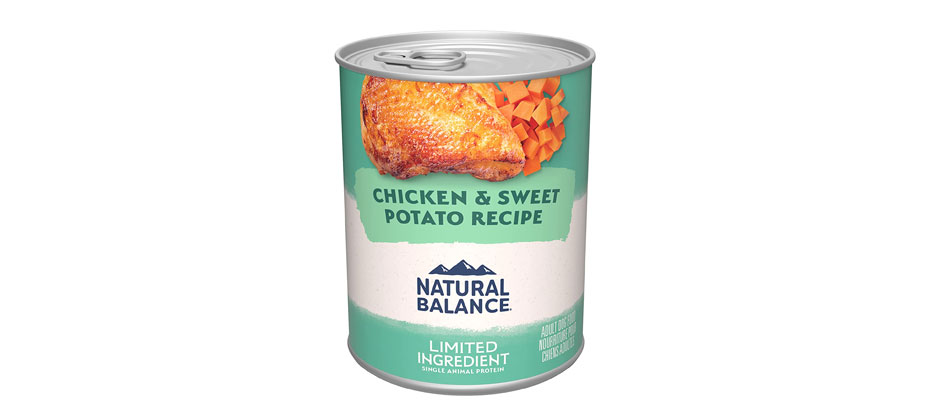
- First 5 Ingredients: Chicken, Chicken Broth, Potatoes, Sweet Potatoes, Dehydrated Potatoes
- Primary Proteins: Chicken
- Calories: 405 kcal/13-oz can
- Allergens: Chicken, Salt (irritant)
- Flavor: Chicken & Sweet Potato
- Type: Canned Dog Food
- Life Stage: Adult
Another delicious wet food choice on our list. Natural Balance has also gone with a carefully selected limited ingredient food choice to help fussy pups get past their dietary hangups. This food DOES contain chicken (which is only a problem for dogs that have developed a chicken allergy). However, it is otherwise free of allergenic ingredients such as wheat, corn, soy, and other potentially difficult ingredients.
This perfectly balanced wet food utilizes the easygoing, gentle effect of chicken as the key protein with the highly-digestible element of sweet potatoes for a complete and balanced diet with limited risk. Maintaining good gut health also has a knock-on effect on your dog’s immune health. By evening out the good bacteria in the gut, the immune system is able to focus on the more important things, therefore strengthening your dog’s natural defenses.
Chicken, Chicken Broth, Potatoes, Sweet Potatoes, Dehydrated Potatoes, Chicken Liver, Chicken Meal, Canola Oil (Preserved with Mixed Tocopherols), Dicalcium Phosphate, Vitamins (L-Ascorbyl-2-Polyphosphate (Source of Vitamin C), Vitamin E Supplement, Thiamine Mononitrate, Niacin, D-Calcium Pantothenate, Vitamin A Supplement, Riboflavin Supplement, Vitamin D3 Supplement, Vitamin B12 Supplement, Pyridoxine Hydrochloride, Folic Acid), Minerals (Zinc Proteinate, Zinc Sulfate, Ferrous Sulfate, Iron Proteinate, Copper Sulfate, Copper Proteinate, Manganese Sulfate, Manganese Proteinate, Calcium Iodate, Sodium Selenite), Calcium Carbonate, Guar Gum, Salt, Natural Smoke Flavor, Carrageenan, Potassium Chloride, Yucca Schidigera Extract, Choline Chloride, Rosemary Extract.

10 Diamond Naturals Skin & Coat Real Salmon and Potato Recipe Dry Dog

- First 5 Ingredients: Salmon, Fish Meal, Potatoes, Lentils, Peas
- Primary Proteins: Salmon, Fish
- Calories: 337 kcal/cup
- Allergens: Fish Meal, Dried Yeast, Flaxseed, Salt (irritant)
- Flavor: Salmon & Potato
- Type: Dry Dog Food
- Life Stage: Adult
Another calculated formula by Diamond Naturals. This skin and coat formula is perfect for supporting dogs that may struggle with the physical side effects of a sensitive stomach, such as itching, and dry skin. Not only does this particular formula concentrate on improving your dog’s skin condition with the use of omega fatty acids thanks to the use of fresh salmon. But it also helps with digestion as it is chock-full of probiotics, antioxidants, and fruits and vegetables, whilst avoiding artificial flavors and colorings.
The most difficult part of this recipe is probably the use of dried yeast and salt, both of which can be irritants for dogs with particularly sensitive digestive systems. In particular, yeast can cause potentially uncomfortable flatulence. However, this type of reaction to yeast of uncommon, and evident rather quickly. So if you find your pup is having a hard time digesting these ingredients we would recommend trying an alternative recipe that avoids the use of yeast in any form.
Salmon, Fish Meal, Potatoes, Lentils, Peas, Pea Flour, Canola Oil (Preserved With Mixed Tocopherols), Dried Yeast, Flaxseed, Tomato Pomace, Natural Flavor, Dicalcium Phosphate, Salt, Potassium Chloride, Dl-Methionine, Choline Chloride, Taurine, Dried Chicory Root, L-Carnitine, Kale, Chia Seed, Pumpkin, Blueberries, Oranges, Dried Kelp, Coconut, Spinach, Carrots, Papaya, Dried Lactobacillus Plantarum Fermentation Product, Dried Bacillus Subtilis Fermentation Product, Dried Lactobacillus Acidophilus Fermentation Product, Dried Enterococcus Faecium Fermentation Product, Dried Bifidobacterium Animalis Fermentation Product, Vitamin E Supplement, Iron Proteinate, Zinc Proteinate, Copper Proteinate, Ferrous Sulfate, Zinc Sulfate, Manganese Sulfate, Copper Sulfate, Potassium Iodide, Thiamine Mononitrate, Manganese Proteinate, Ascorbic Acid, Vitamin A Supplement, Biotin, Niacin, Calcium Pantothenate, Sodium Selenite, Pyridoxine Hydrochloride, Vitamin B12 Supplement, Riboflavin, Vitamin D3 Supplement, Folic Acid. Contains A Source Of Live (Viable), Naturally Occurring Microorganisms.

Dog Food for Dogs With Sensitive Stomachs: Buyer’s Guide & FAQs
You noticed that your dog is passing loose watery stools more frequently now than ever before. This is prompting you to think that your pooch already has sensitive stomach. Unfortunately, determining the exact cause of the stomach upset can be very challenging, to say the least. You will need the help of your veterinarian to help rule out the possibility of other causes. You will also need to read our comprehensive guide to buying dog food for sensitive stomachs to gain a better understanding of this canine condition.
How to Determine If Your Dog Has a Sensitive Stomach
There are a few more clear-cut ways of telling if your dog is struggling with stomach sensitivities so long as you’re paying the right attention. Seeing as a lot of it tends to happen when they go out to relieve themselves, you may way to watch them for the first few weeks if you’re switching them to new food. Even with the best dog foods, the initial change can irritate any dog’s stomach, but it should settle down within a week. If any of the following problems seem to occur with your dog, then they may have a sensitive stomach and be in need of gentler or more digestible food:
- Excessive wind
- Intermittent loose stools
- Diarrhea
- The urgency to go to the bathroom
- Nausea or vomiting
- Lack of appetite
- Lethargy
- Lack of interest in playing and interacting
- Weight loss
What to Do If Your Dog Shows Symptoms of a Sensitive Stomach
If your dog starts to exhibit the symptoms listed above then you might want to look into getting them checked over by your vet. These symptoms can be connected to multiple health problems including:
- Irritable bowel syndrome (IBS)
- Inflammatory bowel disease (IBD)
- Colitis
- Gastroenteritis
- Pancreatitis
There are often wants to work around these difficulties, however, there is no guarantee that it will be 100% fixed. Often a change in diet and dietary limitation can help to massively improve the symptoms, which is where a limited ingredient diet may come in handy.

Ingredients in Dog Food that Cause Upset Stomachs in Dogs
There are a variety of allergies and intolerances that can cause your dog’s stomach to become irritated or hypersensitive, leading to digestive distress. Each allergy has its own set of ingredients worth avoiding. These include:
Gluten Intolerance
Gluten intolerance is rare and difficult to pinpoint. It is often triggered by the gluten found in certain ingredients, which is why gluten and grain allergies often come hand-in-hand as certain common grains used in a lot of dog foods typically contain gluten. In order to have gluten intolerance diagnosed, you will need to take your dog to the vet where they will undergo a few tests to identify the issue (often via a blood test). Soy and corn may be worth avoiding if your dog has a gluten intolerance.
Grain Allergy
Not all dogs experience grain allergies as some publications may have you believe. However, grain allergies are the more common cause of stomach sensitivities alongside protein (a relatively newly discovered problem area). You will notice there are a lot of grain-free dog food options out there in order to accommodate the pups that struggle with this troublesome allergy. A few of the grains you may want to avoid if your dog has a hard time with them are wheat, oats, rye, and yeast.
Protein Allergy
Protein allergies aren’t something your dog is born with, but something they can develop. As unusual as it sounds, adult dogs can develop an allergy to a certain protein as a result of being fed that protein consistently throughout its life. After some time their body can start to have difficulty breaking the protein down, resulting in difficulty with digestion. This can potentially be avoided by trying to circulate their food flavors wherever possible. If your dog does develop a protein allergy, it will likely be in response to beef, chicken, pork, or egg, as these are the most commonly used proteins in dog food.
Sources:
- Natalie Stilwell, DVM, What’s the Best Food for Dogs With Sensitive Stomachs?, PetMD
- Dog Nutrition Tips, ASPCA
Frequently Asked Questions
There are quite a few things that could potentially cause stomach sensitivities in dogs, such as certain medications, allergies, overeating, parasites, ulcers, intestinal blockage, stress, irritable bowel syndrome, colitis, gastroenteritis, inflammatory bowel disease, and pancreatitis to name a few. If you’re unsure as to what could be causing your dog’s stomach to react in such a way, do not hesitate to get in touch with your vet to get some professional advice.
If you’re going for an ultra-digestible diet, you need to aim for high fiber dog food. Good examples of easily digestible food include cooked sweet potato, cooked brown rice, boiled vegetables, boiled plain chicken, boiled or canned pumpkin, broths, and wet dog food that is high in fiber and moisture content. These can be used either on their own or added to your dog’s daily diet to help encourage better digestion.
If your dog has a particularly sensitive stomach, try to aim for a dog food that is low in common allergens. That means avoiding grains, soy, corn, gluten, and maybe even some of the more troublesome proteins such as pork, chicken, egg, and beef. Though these types of diets are at the more extreme end of sensitivity. If your pup simply struggles to digest their food easily, aim for a food that is high in fiber with plenty of easily digestible ingredients such as brown rice which is a great ingredient for digestibility.
There are quite a few ingredients in dog food that can be potential allergens or irritants that cause a negative response. More than you might realize. Limited Ingredient Dog food is designed to remove most, if not all, of those known allergens and irritants, leaving just the ingredients that should hopefully not cause any kind of reaction or allergy.
The aim of a Limited Ingredient Diet (LID) is to reduce the possible problem foods so that if your dog should still struggle with a sensitive stomach, it becomes much simpler to identify what could be the cause as the ingredients list is significantly shorter. Effectively working by process of elimination.
Yes, depending on the dog. Eggs are a known protein allergen for some dogs, and so if your little buddy does have a sensitive stomach to certain proteins you may find they struggle a little. However, is it not a common allergy, and eggs themselves are great sources of protein and perfectly easy for dogs to digest given they don’t already have an allergy to them.



